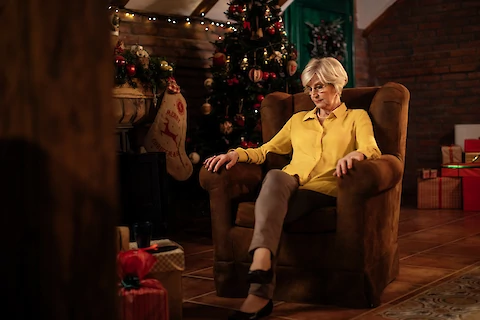
5 Signs of Seasonal Affective Disorder for Seniors
According to MedlinePlus, Seasonal Affective Disorder (SAD) affects up to 3% of the general population. SAD manifests itself during the winter months when daylight hours are shorter, and there's less sunlight in the morning, resulting in cases of depression, anxiety, and sleep disorders.
Your senior loved one could also experience:
- Sleep changes
- Mood swings
- Lack of interest in leisure activities
- Social withdrawal
- Mental confusion
Observe these signs to help ensure that your loved one starts feeling better.
1. Sleep Changes
Winter months can be particularly challenging for relatives or caregivers of seniors when the loved one suffers from Seasonal Affective Disorder (SAD) or the winter blues. Though SAD occurs in all age groups, seniors may have more difficulty producing and using serotonin, which helps regulate moods and sleep patterns. Seniors can experience symptoms of SAD even if they've never had it before due to this decline in serotonin production.
2. Mood Swings
One of the most common symptoms of Seasonal Affective Disorder is mood swings. The human brain responds to light and dark cycles. Less daylight can change happiness and energy levels. Seniors with Seasonal affective disorder may start feeling more depressed or sad. Additionally, they may have difficulty getting out of bed in the morning. These feelings may get worse as winter progresses.
3. Lack of Interest in Leisure Activities
Watching TV, reading a book, or playing with grandchildren are activities that seniors may have always enjoyed. Yet, they may not be as appealing during Seasonal Affective Disorder.
As days get short and the nights prolong, these activities may not provide much light or warmth. Your elderly loved ones in Warren may prefer to spend more time inside and less time outside.
4. Social Withdrawal
Seniors with Seasonal Affective Disorder often experience social withdrawal. They avoid social interactions, preferring to be alone and spend time in isolation. Other symptoms of social withdrawal include:
- Shorter, less frequent conversations with friends and family members
- Feelings of hopelessness and guilt
- Declining health due to lack of exercise
- Reduced appetite or weight loss
Social withdrawal can lead to loneliness, and seniors can lack support from friends and family.
5. Mental Confusion
Mental confusion is one of the most common symptoms during winter months. With shorter daylight hours, seniors may find it difficult to concentrate or remember simple tasks. If your elderly loved one struggles to complete tasks like washing dishes or folding clothes, they could be experiencing mental confusion from the lack of sunlight.
Help Seniors Beat the Symptoms of Seasonal Affective Disorder
Caregivers and adult children must recognize and mitigate SAD symptoms before they affect day-to-day life. SAD affects the mood and energy levels of those living in areas with seasonal changes, such as Erie and Warren.
When caring for your senior loved one, choosing the right provider is a decision you don't take lightly. Senior Helpers Erie understands that every individual and situation is different. That's why we provide customizable care packages tailored to your loved one's needs so they can feel assisted, safe and secure in their home.
Is there anything better than seeing your elderly loved ones happy? When they are happy, you know we have done our job. Contact us today and learn more about how Senior Helpers can help keep your loved ones in Erie and Warren safe and comfortable.